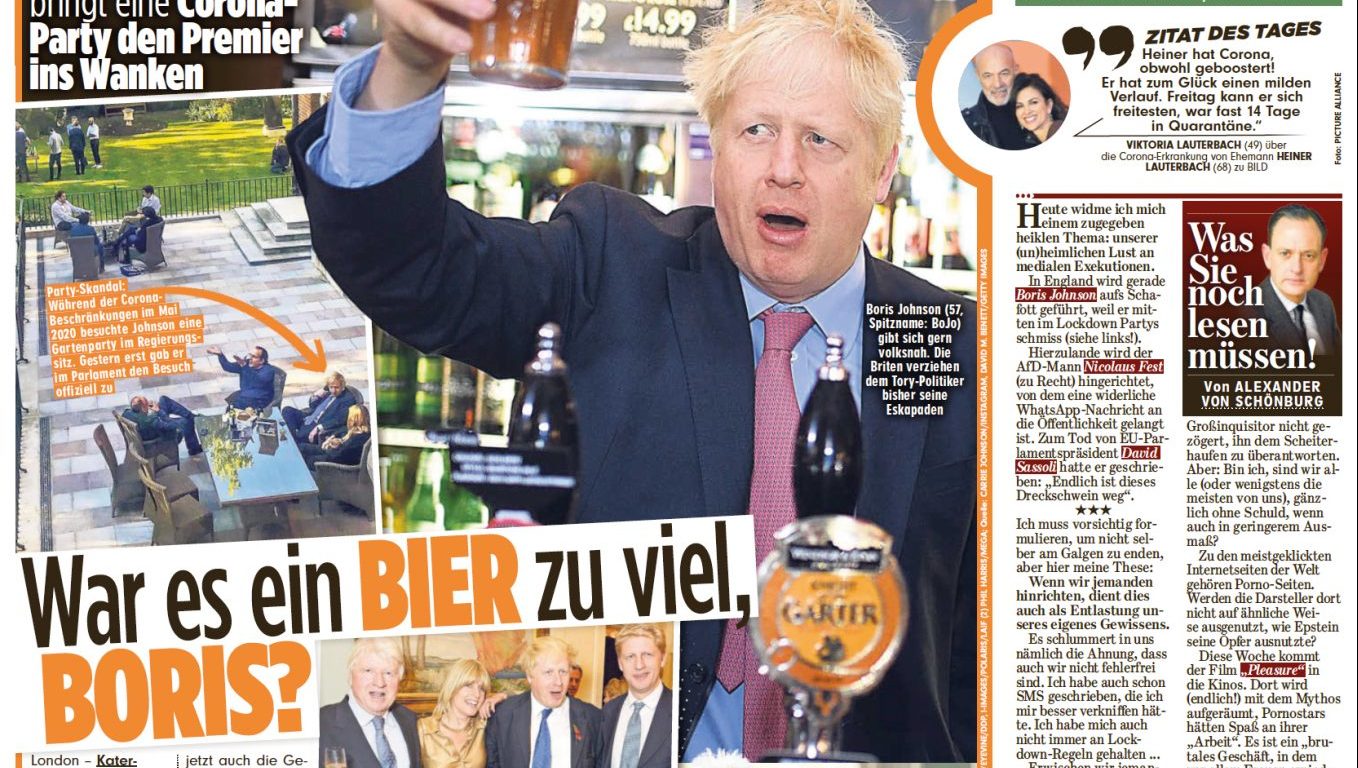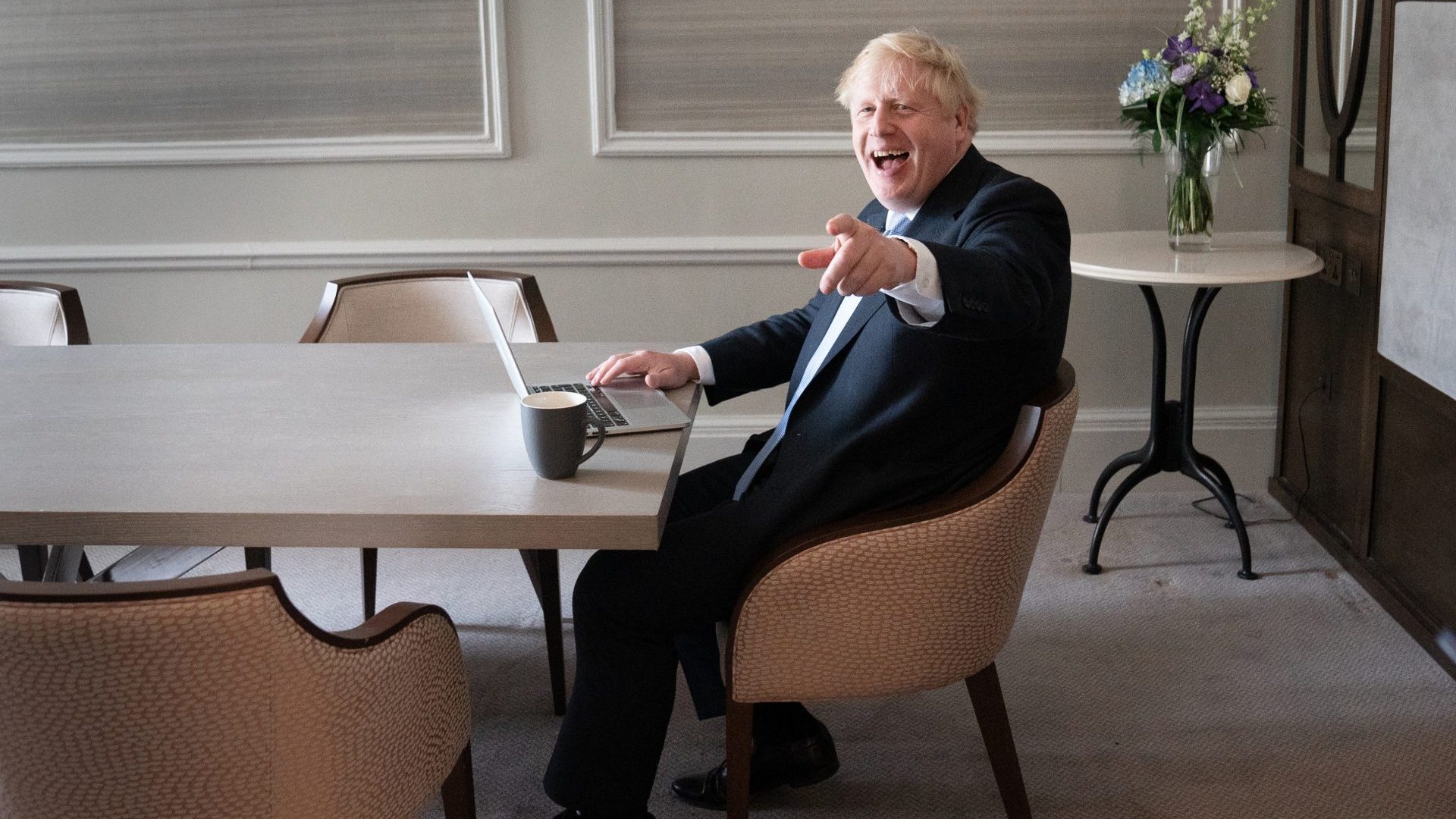The other day I tried to explain yet another British scandal to my newsdesk in Berlin. “They had a curry?” my editor asked. She sounded puzzled. “Come on, there isn’t even any champagne involved? At least it makes for a better headline: ‘Downfall by curry’.”
Partygate, Beergate, Currygate. The continent follows current British politics with a mixture of bemusement and incredulity. After two years of the pandemic, in the middle of a war in Europe, the worst cost of living crisis in decades and another Brexit fallout looming, the United Kingdom obsesses over a £200 invoice from a Durham curry house.
Few places in the world are as exciting for a political correspondent like London. But it is increasingly a challenge to explain British politics to a wider audience outside Britain (and probably also inside, but that’s not my job).
When the news came last week that Boris Johnson wouldn’t get any more Partygate fines, I did not even pitch an analysis to my editors, knowing it would soon be out of date because in a few days the Sue Gray report will be
published. After that, there’s the Commons inquiry into whether the prime minister lied to Parliament. Meanwhile, the British government has launched Season 2 of a saga called the Northern Ireland Protocol. Not surprisingly, the European ratings for this one are also dropping.
While Germans and others remain in a state of shock out of fear that Vladimir Putin might at any moment send his nuclear missiles flying, British politics seems rather oblivious to the threat of a third world war. The repercussions of Keir Starmer’s late-night beer upon the next by-election in Wakefield simply are of a much bigger significance.
In principle, to Europeans, that’s a good thing. It seems to confirm the benign rawness of the British political system. Since Britain lacks a written
constitution, it is of the utmost importance that government and Parliament’s representatives respect the spirit of the law and internalise
what constitutes acceptable behaviour. The duel of government and opposition, symbolised by the green benches on both sides of the House of Commons, produces ruthless accountability – for the sake of the citizens.
Or at least that is the theory, taught and admired everywhere on the other side of the Channel. But the Partygate saga has confounded it in many respects. For a start, Europeans can see that the idea of a self-cleansing British system has failed because the main protagonist has been able to get away with things thanks to circumstance.
Boris Johnson is obviously a lucky general. Long before Partygate, the pandemic was covering up the initial fallout from his Brexit. Then Putin decided to invade Ukraine and thereby attack Europe’s post-war security
order, all of which made Johnson’s until then existential question – if he was really ambushed by a cake – a rather pettifogging issue.
In the case of Ukraine, Johnson got lucky twice. It was easy for him to stand up to Moscow and openly support Kyiv. The British military and intelligence community remains superior to many of their European counterparts. They saw the war coming and were ready to react, delivering heavy defensive weapons to Ukraine weeks before Putin started his invasion.
Meanwhile, the British public strongly supports confronting Russia. That made the British position on Ukraine consistent and solid from the beginning. Johnson seized the chance to transform himself from a ridiculed
“Partygate PM” to the leader of a powerful country urgently needed in Europe. Opinion polls in Britain show this magic act has not quite worked – yet – but he is still in office.
When viewed from Europe, it also seems that while finding new ways to escape his fate, Johnson himself has shown no respect whatsoever for the sacred British principle that accountability does not stop with the leader. He has refused to accept the consequences when found guilty. This has further harmed the reputation of the UK among Europeans.
“Most of the French people have made up their mind on Boris Johnson. They think he is not fit for the job, and that there already was an obvious lack of leadership in Downing Street during the pandemic,” says Cécile Ducourtieux, London editor for Le Monde.
Johnson’s eccentric character is a blessing, but also a curse. He attracted global attention long before moving into No. 10. What European could not be astonished by a London mayor who does not mind being photographed stuck on a zip wire, clinging on to a couple of Union flags?
“Spanish readers have followed everything related to Partygate with immense curiosity, sarcasm and outrage,” says El País’ London editor Rafael de Miguel, whose own country itself has been paralysed by the scandals around Juan Carlos I, the former King and head of state. “Even though Johnson’s image has improved a little because of the determination he’s shown in his support of Ukraine, thousands of memes, videos and jokes spread through social networks. This has painted an irreparable image of something of a clown.”
Lockdown leisure inside Downing Street also filled a whole page in Germany’s biggest-selling tabloid, Bild. Except it wasn’t published on the inside political news pages but on the last page, traditionally the space for
gossipy fun and entertainment. “Did you have one beer too much, Boris?”,
Bild asked, printing half a dozen pictures of Johnson plus friends and family, including Dilyn the dog.
The sequel to Partygate has not drawn anything like as much European attention as the original to go beyond the audience’s attention capacity though. Keir Starmer is little known in Europe yet, plus he isn’t the kind of flamboyant figure whose curriculum is packed with colourful chapters. Nevertheless, many Europeans continue to avidly follow British affairs because they are intrigued not only by the political parties’ brutal rivalry but also the British media’s blunt bias – crucial for stoking the ongoing accusations and counter-accusations.
Still, what people on the continent really can’t understand is why Starmer’s curry and Johnson’s parties have been consuming so much space and energy for so many months. Bild columnist Franz Josef Wagner recently wrote: “What is going on in London? We are faced with a war with Russia. London meanwhile rows over parties. Are the English crazy?”
Wagner then provided his version of an answer: “No. For them, it is about fairness. Nobody is above the law, not even the prime minister”. This now looks like a naive German view. At least thus far, none of those rows is having a career-threatening impact on the figures involved.
At the same time, Partygate/Beergate/Currygate raise the question abroad of the role of the police. During a Welt TV channel report from Downing Street the other day, the host back in Berlin asked what for German viewers is an
obvious question: Why did all the police around Whitehall not interfere with trolley bags full of booze and karaoke parties? Obvious, but still I could not answer it. More recently, European commentators have branded as “absurd” the notion put forward by Conservative MPs that Keir Starmer was putting “deeply inappropriate” pressure on the police by offering his resignation if he was found guilty of breaking lockdown rules.
Absurd is the word. And the other story from Britain that is getting some notice in Europe can compete in terms of absurdity: Brexit, or more precisely its offshoot, the Northern Ireland Protocol. When the Johnson government presented the Internal Market Bill back in September 2020, it was front-page stuff on the continent. A British prime minister, calmly threatening to break agreements with his “friends and partners in Europe”, undermining international law. It caused an outcry from Warsaw to Washington.
The second time round, though, it’s not that big a headline anymore. Patience is wearing thin, and so is attention. This exasperation with the Brits, complemented by the absurdity of their actions, makes it almost
impossible to win an audience back home. People turn off or tune out in
frustration.
The logic is fuzzy, to say the least. We are told that the EU’s offer last autumn to improve the Protocol were “simply not good enough”. What’s not to like if Brussels agrees to reduce 80% of controls, the reporter questions. Because, goes the response, this is still 20% more controls than there are now. On what basis? On the basis that there are no checks at all. Why? Because the UK government never implemented the relevant checks by unilaterally
extending grace periods, therewith ignoring what the prime minister has negotiated and signed. Any more questions? No, thank you.
If the current state of British politics feeds into voters’ growing lack of trust in the executive and their elected representatives, it feeds into European’s impression of the United Kingdom being a country that has lost her way; consumed by navel-gazing and populist politics, still kicking the controversial Brexit can down the road as no better story has arrived.
Looking at the challenges the Brits are facing at home, and the challenges Europe and the west face together in the world, it leaves us outside observers with an anxious feeling of dangerous shallowness.
Stefanie Bolzen is UK and Ireland correspondent for WELT and WELT am Sonntag



